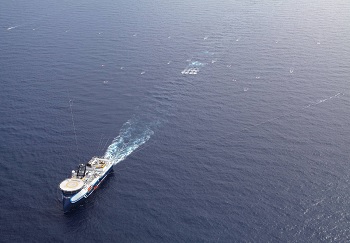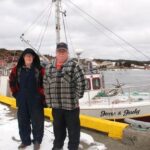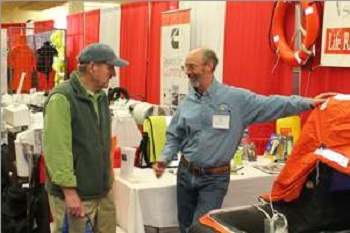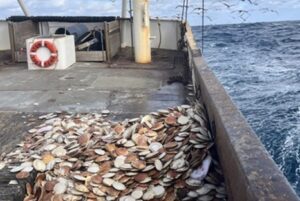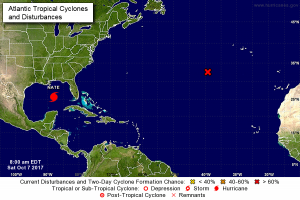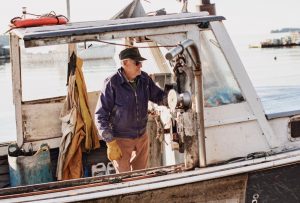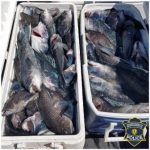Tag Archives: Connecticut
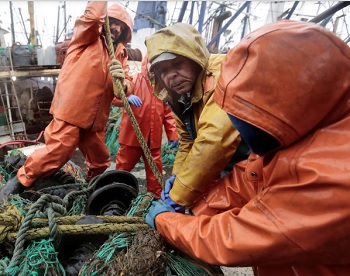
New rule allows NB and Southern NE fishermen to stop throwing away fish
The change, which is also expected to be made in Rhode Island and Connecticut, will allow fishermen to make one trip and then return to the three states and offload their catches without going back to sea after every offload,,The conditions are that they must have licenses to catch fluke in the states where they offload, and the states must be open for catching fluke. “We just want to go from state to state and not kill fish unnecessarily. Anyone who thinks fishermen don’t care about fish is wrong,” said Tony Borges, owner and captain of Sao Paulo, Photos, >click to read< 14:12
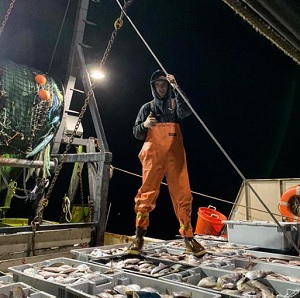
Stonington Commercial Fishermen Catch A Break
The New Law Has One Catch, But A Stonington Fisherman Says It’s A Good Catch – The only catch is that the agreement is for a very particular fish and season; the summer flounder, or fluke, from January to April. Andrew Williams 22, a fourth generation fisherman from Stonington, currently working on F/V McKenzie Paige, says being able to offload in more than one state is a good thing and may help sustain the future of commercial fishing in Stonington. Williams praised the new law saying it provides myriad benefits in that important, and short, winter season. >click to read< 10:54
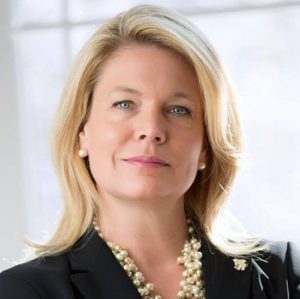
Connecticut: New dual landings law intended to benefit local fishermen
A bill introduced by state Sen. Heather Somers, aimed at easing regulations preventing local commercial fishermen from landing catches in multiple states on the same trip, has been signed into law by Gov. Ned Lamont. The law currently in effect requires fishermen to designate their catch for a specific state and offload the catch in that state, even if the fishermen were licensed in multiple states and regardless of whether the catch was made in federal or state waters. Fishermen had to make multiple trips per week far offshore to make each catch designated for each state. >click to read< 08:55
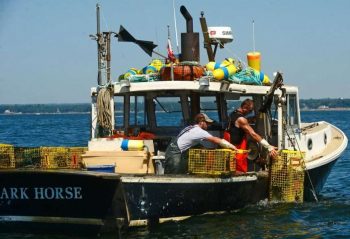
Toxic lobsters? – Long Island Sound dumping dispute nears tipping point
Connecticut says the new underwater dump site is needed to maintain the state’s economic development effort – including its lucrative submarine construction business at Electric Boat’s shipyard,,, New York says the site will be harmful to its ecology and tourism, and Connecticut could, and should, dump the material it dredges up somewhere else.,,, Toxic lobsters? Lobstering is still done in Long Island Sound, though there are far fewer lobsters than in the past. >click to read<10:08
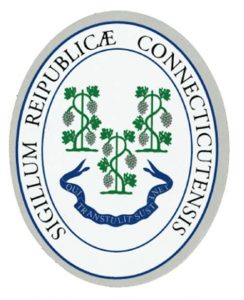
Connecticut’s Commercial Fishermen Express Interest In Two Bills
Two bills that could have a big impact on Connecticut’s multi-million dollar commercial fishing business were the subject of an Environment Committee public hearing Friday. The legislation would allow commercial fishermen to take one day’s catch and bring them across state lines — to Rhode Island and New York — not just Connecticut. The other bill would “prohibit the possession and trade of shark fins in the state.” The aim is to protect sharks from skinning for trade but commercial fishermen are worried that the bill may lead to a complete ban on shark. >click to read<18:30
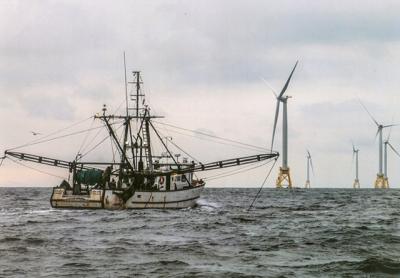
First U.S. Offshore Wind Developer Acts on Fishing Gear
U.S. offshore wind developer Deepwater Wind has adopted a first-of-its-kind procedure designed to prevent impacts to commercial fishing gear from its activities. Deepwater Wind’s Block Island Wind Farm is America’s first offshore wind farm, and the company is currently in active development on utility-scale wind farms to serve Rhode Island, Connecticut, New York, New Jersey and Maryland. The procedure was developed in close coordination with the commercial fishing industry and is based off extensive feedback from fishermen in ports up and down the Atlantic coast. Deepwater Wind believes that keeping fishermen informed is the key to preventing damage to fishing gear. >click to read<18:19
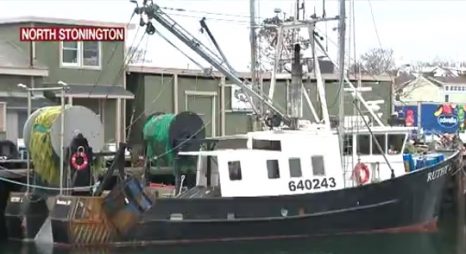
Proposed wind farms off of New London worry local fishermen
Last week, Ørsted and Eversource announced a joint venture and has submitted a bid to build Connecticut’s first offshore wind farm, in response to the state’s request for proposals for offshore wind energy generation. The approximately 200-megawatt project – Constitution Wind – would be the first of its kind to serve the state of Connecticut and would be located in federal waters 65 miles off shore. “That’s the traditional fishing ground where they’re talking about now,” said Stonington Fisherman Bob Guzzo. >click to read<18:56
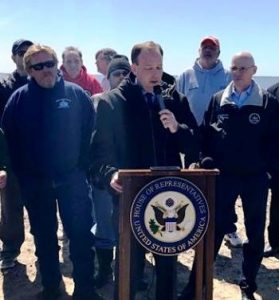
BLACK SEA BASS – THE NEW “WAR BETWEEN THE STATES”
On April 9, 1865, General Robert E. Lee surrendered to General Ulysses S. Grant at the Appomattox Court House in Virginia, signifying the end of the U.S. Civil War. One hundred and fifty-three years to the day, north and south are set to do battle yet again, this time over sea bass. From April 30 through May 3, the Atlantic States Marine Fisheries Commission (ASFMC) will hold its 2018 spring meeting in Arlington, VA, a city that was once the dividing line between Confederates to the South and the Union Army to the north during the bloodiest war in U.S. history. >click to read<12:41
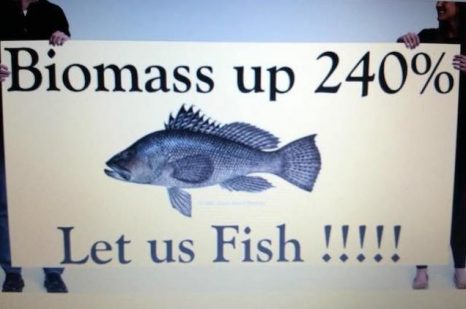
Black sea bass quota reduction for N.Y. has local lawmakers up in arms
The decision last month by the Atlantic States Marine Fisheries Commission to reduce New York’s black sea bass quota by 12 percent this year has anglers, state environmental regulators and local lawmakers up in arms. “This action discriminates against the State of New York. It would have a significant adverse effect on the Long Island economy,” State Senator Ken LaValle (R-Port Jefferson) and Assemblyman Fred Thiele (I-Sag Harbor) said yesterday in a joint statement. New York has joined Massachusetts, Rhode Island and Connecticut in an appeal,,, >click to read<09:12
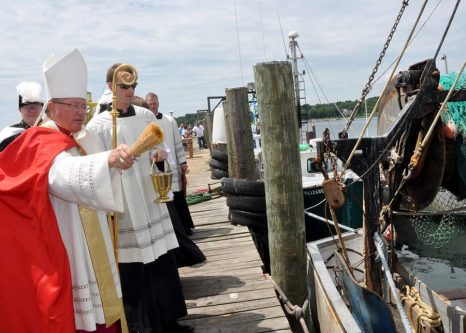
64th Blessing of the Fleet ceremonies set for Sunday in Stonington, Connecticut
The 64th annual Blessing of the Fleet in the borough will honor local fishermen who have died at sea with traditional remembrances and prayers and, for the first time, an exhibit of artifacts and photographs from local fishing boats. The Blessing is slated for Sunday, although festivities kick off today with the Blessing of the Fleet 5k road race at 6 p.m. in the borough. Each year, the event focuses on commemorating fishermen who died at sea, with special prayers for the safety and success of current fishermen, said Georgia Crowley, who co-chairs the event with her husband, Mike, and Ellie Dunn, all members of St. Mary Church in the borough. click here to read the story 11:55
Decision Will Allow Disposal Of Dredged Materials In Long Island Sound
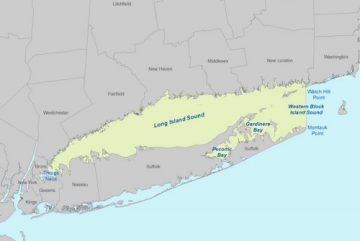 Federal environmental officials Friday dismissed protests from New York and issued a final ruling that will allow operation of an open-water site in eastern Long Island Sound for disposing of dredged materials from harbors and ports. The EPA decision drew applause from Connecticut’s congressional delegation and state officials who argued that halting dredge disposal in the eastern Sound would be a damaging economic blow for shoreline communities in this state. In its ruling, the EPA shifted the location of the new open water disposal site to place it entirely within Connecticut waters. New York officials and environmentalists fear the open water disposal of muck dredged primarily from Connecticut harbors could pollute the waters of the Sound and harm commercial and recreational fishing. Read the story here 12:34
Federal environmental officials Friday dismissed protests from New York and issued a final ruling that will allow operation of an open-water site in eastern Long Island Sound for disposing of dredged materials from harbors and ports. The EPA decision drew applause from Connecticut’s congressional delegation and state officials who argued that halting dredge disposal in the eastern Sound would be a damaging economic blow for shoreline communities in this state. In its ruling, the EPA shifted the location of the new open water disposal site to place it entirely within Connecticut waters. New York officials and environmentalists fear the open water disposal of muck dredged primarily from Connecticut harbors could pollute the waters of the Sound and harm commercial and recreational fishing. Read the story here 12:34
Connecticut – DEEP to host hearing on shark, menhaden plan
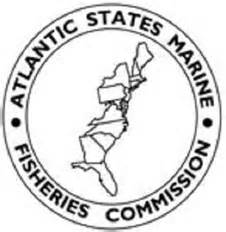 The state Department of Energy and Environmental Marine Fisheries Division will host a public hearing to get input on the Atlantic States Marine Fisheries Commission’s draft management plan for coastal sharks and for menhaden. The hearing will take place at 7 p.m. June 28 at DEEP Marine Headquarters, 333 Ferry Road. The purpose of the plan for coastal sharks is to maintain consistency between federal and state fishery management plans, where possible, and to better incorporate the intent of the smooth dogfish limited exception in the Shark Conservation Act of 2010 into state regulations. Fishermen and other interested groups are encouraged to provide input on the plan at the hearing or by providing written comment. Read the rest here 08:43
The state Department of Energy and Environmental Marine Fisheries Division will host a public hearing to get input on the Atlantic States Marine Fisheries Commission’s draft management plan for coastal sharks and for menhaden. The hearing will take place at 7 p.m. June 28 at DEEP Marine Headquarters, 333 Ferry Road. The purpose of the plan for coastal sharks is to maintain consistency between federal and state fishery management plans, where possible, and to better incorporate the intent of the smooth dogfish limited exception in the Shark Conservation Act of 2010 into state regulations. Fishermen and other interested groups are encouraged to provide input on the plan at the hearing or by providing written comment. Read the rest here 08:43
New York, and Connecticut Lawmakers seeking $65 million to clean up Long Island Sound
 With new legislation proposed to protect and restore the waters of the Long Island Sound, Connecticut and New York lawmakers are hoping to reverse the effects of decades of over-development and pollution. The Long Island Sound Restoration and Stewardship Act would combine two water quality and shore restoration programs to be funded at, respectively, $40 million and $25 million per year through 2020. Read the rest here 19:22
With new legislation proposed to protect and restore the waters of the Long Island Sound, Connecticut and New York lawmakers are hoping to reverse the effects of decades of over-development and pollution. The Long Island Sound Restoration and Stewardship Act would combine two water quality and shore restoration programs to be funded at, respectively, $40 million and $25 million per year through 2020. Read the rest here 19:22
Connecticut’s Controversial Shellfish Bill Dead For 2015
The controversial bill, which the legislature’s legal staff warned was potentially unconstitutional, was “recommitted” to the General Assembly’s Environment Committee Saturday. A coalition representing the biggest shellfishing companies in the state, together with several influential lawmakers, had been seeking legislation to create a new shellfishing council to direct all state shellfishing regulatory policies. Malloy’s administration opposed the bill and also opposed the budget-related plan to shift the aquaculture unit from one state department to another. Read he rest here 08:20
Connecticut DEEP investigating large-scale fish kills of Atlantic Menhaden and other species
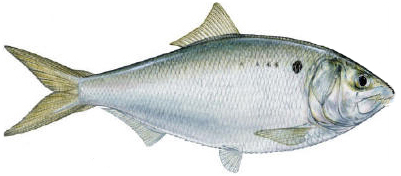 Connecticut’s Department of Energy and Environmental Protection is investigating multiple natural fish kills affecting thousands of Atlantic menhaden in the past week, including in the Quinnipiac River, Clinton Harbor and the lower Connecticut River, according to a press release from the DEEP. Menhaden have also died off in the Thames River between Norwich and the U.S. Naval Submarine Base in Groton, the DEEP said. Small numbers of fish kills of other species have been reported in these areas as well, the release said. Read the rest here 14:37
Connecticut’s Department of Energy and Environmental Protection is investigating multiple natural fish kills affecting thousands of Atlantic menhaden in the past week, including in the Quinnipiac River, Clinton Harbor and the lower Connecticut River, according to a press release from the DEEP. Menhaden have also died off in the Thames River between Norwich and the U.S. Naval Submarine Base in Groton, the DEEP said. Small numbers of fish kills of other species have been reported in these areas as well, the release said. Read the rest here 14:37
3-month closure – Connecticut Lobster fishermen taking enforced break

Connecticut inches toward lucrative eel industry
Days after a deal by state lawmakers , a 15-state regional agency proposed to ease rules allowing broader access to the multimillion-dollar global eel market. “Why is it so overwhelmingly concentrated in one state? If we’re going to have fisheries, let’s talk about opening it more fairly,” Read more here 13:58
Connecticut: River herring returning to state waterways
 Two factors have contributed to the local river herring boom: a new culvert built at Rocky Neck in 2009 reopened a previously constricted channel; and beaver dams upstream of Latimer Brook that had cut the fish off from ponds where they mate and spawn have been removed,, theday Read more here 10:03
Two factors have contributed to the local river herring boom: a new culvert built at Rocky Neck in 2009 reopened a previously constricted channel; and beaver dams upstream of Latimer Brook that had cut the fish off from ponds where they mate and spawn have been removed,, theday Read more here 10:03








